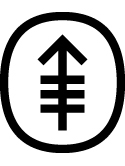Three-drug synergistic inhibition of HIV-1 replication in vitro by 3′-fluoro-3′-deoxythymidine, recombinant soluble CD4, and recombinant interferon-alpha Journal Article
| Authors: | Pan, X. Z.; Qiu, Z. D.; Baron, P. A.; Gold, J. W. M.; Polsky, B.; Chou, T. C.; Armstrong, D. |
| Article Title: | Three-drug synergistic inhibition of HIV-1 replication in vitro by 3′-fluoro-3′-deoxythymidine, recombinant soluble CD4, and recombinant interferon-alpha |
| Abstract: | 3′-Fluoro-3′deoxythymidine (FLT), recombinant soluble CD4 (CD4), and recombinant interferon-alpha (IFNα) were evaluated in two- and three-drug regimens against HIV-1 replication in vitro. Peripheral blood mononuclear cells were studied using p24 antigen production as the virologic endpoints. FLT showed 2.5-fold higher efficacy and a similar selectivity index to zidovudine. Drug interactions were evaluated by the median effect principle and the isobologram technique. FLT, CD4, and interferon alpha at noncytotoxic concentrations inhibited HIV-1 synergistically in two- and three-drug combinations with a combination index smaller than one and dose reduction index greater than one. The three-drug regimen provided greater virus suppression than the two-drug regimen. These results suggest that FLT is an alternative agent to AZT for the treatment of HIV infection either as a single agent or in combination with CD4 and/or interferon-alpha. © 1992, Mary Ann Liebert, Inc. All rights reserved. |
| Keywords: | controlled study; human cell; drug potentiation; nonhuman; human immunodeficiency virus infection; cells, cultured; drug synergism; recombinant proteins; cd4 antigen; virus replication; antigens, cd4; human immunodeficiency virus 1; interferon-alpha; hiv-1; zidovudine; antiviral agents; solubility; virus inhibition; dideoxynucleosides; 3' fluorothymidine; recombinant alpha interferon; human; article; support, non-u.s. gov't; support, u.s. gov't, p.h.s. |
| Journal Title: | AIDS Research and Human Retroviruses |
| Volume: | 8 |
| Issue: | 5 |
| ISSN: | 0889-2229 |
| Publisher: | Mary Ann Liebert, Inc |
| Date Published: | 1992-05-01 |
| Start Page: | 589 |
| End Page: | 595 |
| Language: | English |
| DOI: | 10.1089/aid.1992.8.589 |
| PUBMED: | 1515212 |
| PROVIDER: | scopus |
| DOI/URL: | |
| Notes: | Article -- Export Date: 30 July 2019 -- Source: Scopus |
Altmetric
Citation Impact
BMJ Impact Analytics
Related MSK Work






